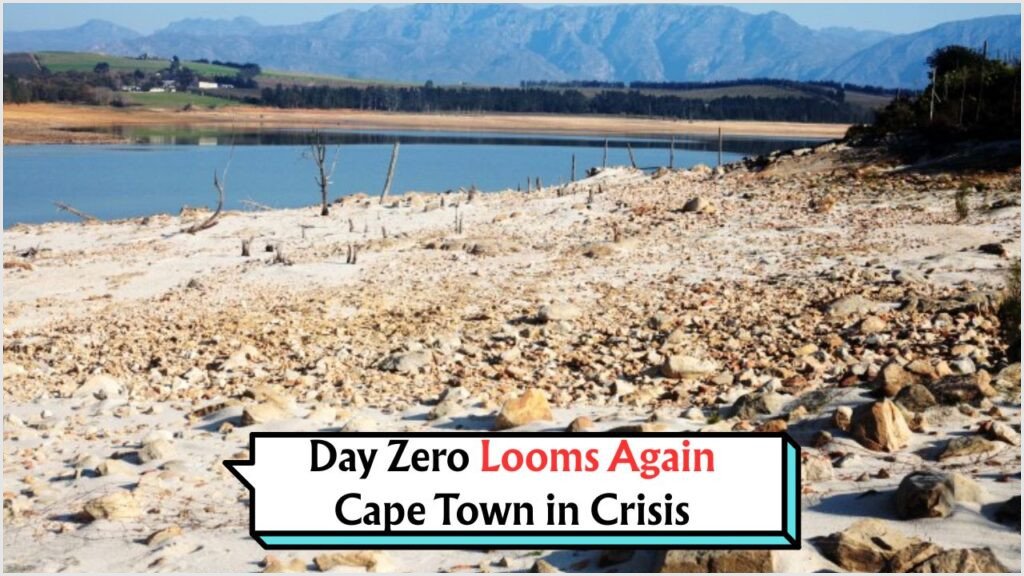August Drought Brings Cape Town’s Water Crisis to a Tipping Point: The month of August has brought Cape Town’s ongoing water crisis to a critical juncture. With rainfall at historic lows, the city’s reservoirs are struggling to maintain adequate levels, posing a serious threat to water security for millions of residents. As the drought persists, authorities are urging citizens to conserve water more than ever, while also exploring long-term solutions to address the crisis. This article delves into the current situation, the impact on daily life, and the strategies being considered to ensure sustainable water management in Cape Town.
Understanding the August Drought Impact on Cape Town’s Water Supply
As Cape Town grapples with the ramifications of an unusually dry August, the city’s water supply system is under unprecedented stress. The lack of rainfall has resulted in significantly decreased inflow to the dams, which are the primary sources of water for the metropolitan area. According to recent data, water levels in major reservoirs have plummeted to alarming lows, sparking fears of potential water shortages in the coming months.
- Current dam levels are averaging around 40%, down from 55% during the same period last year.
- Residents have been subjected to strict water restrictions, limiting daily usage to 50 liters per person.
- Local government officials are in discussions to implement further conservation measures if the situation does not improve.
- Plans to increase desalination efforts are underway, though they are costly and time-consuming to implement.
Table 1: Reservoir Levels in Cape Town
 Discover the Fastest Way to Unlock NSFAS Funds: Thousands Swear by This Proven Appeal Format!
Discover the Fastest Way to Unlock NSFAS Funds: Thousands Swear by This Proven Appeal Format!
| Reservoir | Current Level (%) | Last Year’s Level (%) | Capacity (ML) | Change (%) |
|---|---|---|---|---|
| Theewaterskloof | 38 | 50 | 480,188 | -12 |
| Voëlvlei | 42 | 57 | 164,095 | -15 |
| Berg River | 45 | 62 | 130,010 | -17 |
| Steenbras Lower | 36 | 49 | 33,517 | -13 |
| Steenbras Upper | 40 | 54 | 31,767 | -14 |
| Wemmershoek | 39 | 52 | 58,644 | -13 |
Cape Town’s Water Management Strategies Amid Crisis
In response to the worsening drought, Cape Town has been intensifying its water management strategies. The city has long prided itself on its innovative approaches to water conservation, but the current crisis demands even more rigorous actions. Key strategies include:
- Increasing public awareness campaigns to educate residents on water-saving techniques.
- Fast-tracking the development of new water recycling and desalination plants.
- Enhancing the monitoring of illegal water use through advanced technologies.
- Exploring partnerships with private sectors for sustainable water supply solutions.
- Implementing tariff adjustments to encourage reduced water consumption.
Immediate and Long-Term Solutions for Cape Town’s Water Crisis
Addressing Cape Town’s water crisis requires a combination of immediate actions and long-term solutions. While immediate measures focus on conservation and efficient use, long-term strategies aim at diversifying water sources and increasing resilience against future droughts.
- Short-term: Encouraging greywater systems and rainwater harvesting in households.
- Short-term: Imposing fines for excessive water use and wastage.
- Long-term: Investing in large-scale desalination projects to augment water supply.
- Long-term: Developing groundwater sources through sustainable extraction methods.
- Long-term: Collaborating with international water management experts for innovative solutions.
Table 2: Proposed Solutions and Implementation Timeline
 August 17, 2025: R1,250 Foster Child Grant Payout Begins – Ensure You Receive Your SMS Alert!
August 17, 2025: R1,250 Foster Child Grant Payout Begins – Ensure You Receive Your SMS Alert!
| Solution | Category | Implementation Time | Expected Outcome | Cost Estimation |
|---|---|---|---|---|
| Desalination | Long-term | 5-10 years | Increased water supply | High |
| Greywater Systems | Short-term | 1-2 years | Reduced demand | Medium |
| Rainwater Harvesting | Short-term | 1-2 years | Supplemental supply | Low |
| Groundwater Development | Long-term | 3-5 years | Sustainable extraction | Medium |
| Public Awareness | Ongoing | Immediate | Behavioral change | Low |
The Role of Technology in Alleviating Cape Town’s Water Crisis
Technology plays a crucial role in mitigating the effects of the drought on Cape Town’s water supply. By leveraging advanced tools and systems, the city can better manage its resources and enhance the efficiency of water distribution. Key technological advancements include:
- Smart metering systems that provide real-time data on water usage.
- Automated leak detection systems to minimize water loss.
- Weather prediction models to anticipate and plan for future drought conditions.
- Remote sensing technologies to monitor reservoir levels and catchment areas.
Community Engagement in Water Conservation Efforts
Community involvement is vital in addressing Cape Town’s water crisis. By fostering a culture of conservation and responsibility, residents can significantly reduce water use and contribute to sustainable practices. Key community initiatives include:
- Organizing neighborhood water-saving workshops and events.
- Encouraging the formation of local water conservation groups.
- Promoting school programs focused on environmental education.
Future Challenges and Opportunities in Water Management
As Cape Town navigates its water crisis, it faces both challenges and opportunities. While the current drought underscores the need for immediate action, it also presents a unique opportunity to innovate and transform water management practices. Future challenges include:
- Climate variability and its impact on rainfall patterns.
- Balancing economic development with sustainable water use.
- Ensuring equitable access to water for all communities.
- Securing funding for large-scale infrastructure projects.
Innovative Solutions to Cape Town’s Water Scarcity
Innovative ideas are key to effectively managing Cape Town’s water scarcity. By thinking outside the box and embracing new approaches, the city can turn its water challenges into opportunities for growth and development. Examples of innovative solutions include:
- Developing urban water gardens for stormwater management.
- Implementing aquifer recharge projects to store excess water during wet seasons.
- Utilizing solar energy for desalination processes to reduce costs.
- Exploring the potential of fog harvesting in mountainous areas.
- Promoting water-neutral construction practices in new developments.
FAQ Section
- What is causing Cape Town’s current water crisis?
The crisis is primarily due to prolonged drought conditions and low rainfall, which have significantly reduced water levels in the city’s reservoirs. - How are residents coping with water restrictions?
Many residents are adopting water-saving measures such as using greywater, installing low-flow fixtures, and reducing non-essential water use. - What long-term solutions are being considered?
Long-term solutions include investing in desalination plants, developing groundwater sources, and enhancing rainwater harvesting systems. - How is technology helping to manage the water crisis?
Technology aids in water management through smart meters, leak detection systems, and weather modeling to improve resource allocation and planning. - How can the community contribute to solving the water crisis?
Community efforts can include participating in water conservation programs, attending workshops, and advocating for sustainable practices.




